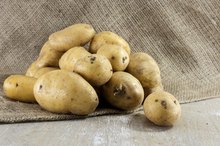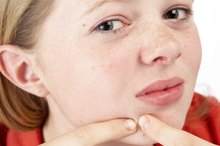What does fact checked mean?
At Healthfully, we strive to deliver objective content that is accurate and up-to-date. Our team periodically reviews articles in order to ensure content quality. The sources cited below consist of evidence from peer-reviewed journals, prominent medical organizations, academic associations, and government data.
- Office of Dietary Supplements: Vitamin A and Carotenoids
- Eatright.org – American Dietetic Association: Healthy Eating for Women
The information contained on this site is for informational purposes only, and should not be used as a substitute for the advice of a professional health care provider. Please check with the appropriate physician regarding health questions and concerns. Although we strive to deliver accurate and up-to-date information, no guarantee to that effect is made.
Are Carrots Good for Acne?
After 30 years of doubting that food plays a role in acne, some conventional medicine practitioners now believe there is a connection. Food doesn’t cause acne; the culprits are excessive oil production in your skin, clogged pores, inflammation and Propionibacterium acnes, bacteria that live on skin. But some food may worsen acne -- by triggering hormonal or allergic reactions -- and some foods can be good for acne. Carrots may fall into either category.
Carrots and Vitamin A
Carrots are among the richest food sources of vitamin A, a nutrient that’s essential for healthy skin 1. Vitamin A is a key ingredient of some topical acne remedies known as retinoids, such as tretinoin 1. It’s also available in oral form in the medication isotretinoin, which must be taken under a doctor’s supervision. Eating more carrots will help to boost naturally the amount of vitamin A available to keep your skin healthy. However, no research studies exist that examine the effect of consuming carrots on acne specifically.
- Carrots are among the richest food sources of vitamin A, a nutrient that’s essential for healthy skin 1.
Food Allergies and Acne
Does Eating Potatoes Give You Acne?
Learn More
If you are allergic to carrots, your acne may become worse. Although allergies to foods such as peanuts and shellfish get a lot of attention, it’s possible for you to develop an allergy to any food, including carrots. According to the University of Maryland Medical Center, food allergies may play a role in adult acne. If you’ve ever suffered with symptoms such as an itchy throat, hives or nausea after eating carrots, you’re likely allergic to them and should avoid eating them or eating them only when they’re cooked.
- If you are allergic to carrots, your acne may become worse.
- Although allergies to foods such as peanuts and shellfish get a lot of attention, it’s possible for you to develop an allergy to any food, including carrots.
Testing Carrots' Role in Your Acne
To determine whether carrots are good for your acne, keep a food diary or log. Make note of whether your skin improves — such as having fewer breakouts — when you eat carrots. The American Dietetic Association recommends adults eat 2 1/2 cups of vegetables daily, and carrots can be part of that intake. On the other hand, if you notice that your acne becomes worse, try eliminating carrots for three to six months to see if your skin improves.
- To determine whether carrots are good for your acne, keep a food diary or log.
Considerations
Are Brown Rice and Sweet Potatoes Good for Acne?
Learn More
Keep in mind that even if carrots help to alleviate your acne, there may be other foods in your diet can aggravate acne. For instance, refined carbohydrates, dairy foods, nuts and chocolates have been linked to acne breakouts, according to the American Osteopathic College of Dermatology. Foods such as carbohydrates and nonorganic dairy may disrupt hormonal activity in your body, such as insulin production, and aggravate acne. Limit your intake of these foods.
- Keep in mind that even if carrots help to alleviate your acne, there may be other foods in your diet can aggravate acne.
Related Articles
References
- Office of Dietary Supplements: Vitamin A and Carotenoids
- AcneNet: What Causes Acne?
- Rocha MA, Bagatin E. Adult-onset acne: prevalence, impact, and management challenges. Clin Cosmet Investig Dermatol. 2018;11:59-69. doi:10.2147/CCID.S137794.
- Legro RS, Arslanian SA, Ehrmann DA, et al. Diagnosis and treatment of polycystic ovary syndrome: an Endocrine Society clinical practice guideline. J Clin Endocrinol Metab. 2013;98(12):4565-92. doi:10.1210/jc.2013-2350.
- Buddenkotte J, Steinhoff M. Recent advances in understanding and managing rosacea. F1000Res. 2018;7. doi:10.12688/f1000research.16537.1.
- Tan AU, Schlosser BJ, Paller AS. A review of diagnosis and treatment of acne in adult female patients. Int J Womens Dermatol. 2018;4(2):56-71. doi:10.1016/j.ijwd.2017.10.006.
- Canavan TN, Chen E, Elewski BE. Optimizing non-antibiotic treatments for patients with acne: A Review. Dermatol Ther (Heidelb). 2016;6(4):555-578. doi:10.1007/s13555-016-0138-1.
- Ramos-e-Silva M, Ramos-e-Silva S, Carneiro S. "Acne in Women." The British Journal of Dermatology. 2015 Jul;172 Suppl 1:20-6.
Writer Bio
Kay Uzoma has been writing professionally since 1999. Her work has appeared in "Reader’s Digest," "Balance," pharmaceutical and natural health newsletters and on websites such as QualityHealth.com. She is a former editor for a national Canadian magazine and holds a Bachelor of Arts in political science from York University.









